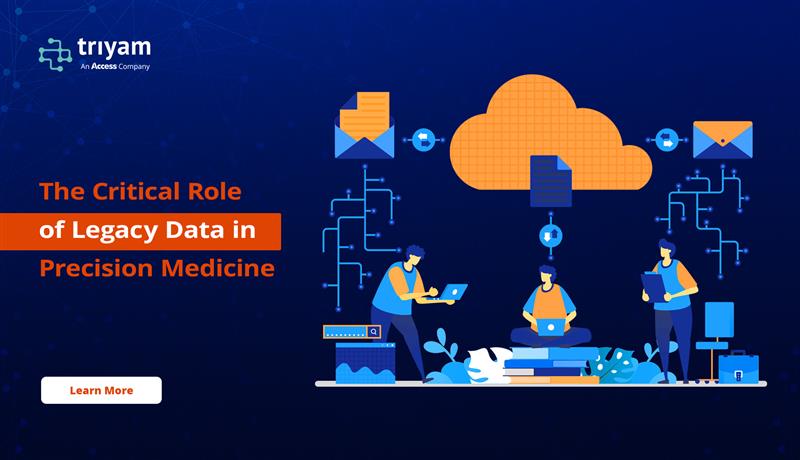A New Era in Healthcare
The future of healthcare is precision medicine. By tailoring treatment plans to individual genetic, environmental, and lifestyle factors, precision medicine aims to move beyond the “one-size-fits-all” approach and offer highly personalized care. From genomics to AI-driven diagnostics, the promise is clear: better outcomes, fewer adverse reactions, and more efficient use of healthcare resources.
However, the path to this future hinge on one critical factor—data. While new systems are designed to capture structured and high-quality data, the majority of a healthcare organization’s information still resides in legacy systems—unstructured, siloed, and in formats not optimized for modern analytics. This is where the importance of legacy data management becomes vital.
The Rise of Precision Medicine: Why It Matters
Precision medicine is not just a technological advancement; it’s a paradigm shift. Its adoption is being driven by several factors:
- Genomic sequencing costs have plummeted, making it more accessible to patients.
- Advanced analytics and AI models now provide predictive insights from massive datasets.
- Policy and payer support is growing, with governments and insurers beginning to reimburse for personalized treatments.
To effectively implement precision medicine, healthcare providers must integrate longitudinal data—from clinical histories and past diagnostics to genetic profiles and social determinants of health. This broad-spectrum data empowers clinicians and researchers to identify patterns, predict disease risks, and personalize treatments.
The Challenge: Legacy Data Is Still the Backbone
Despite the momentum toward modern systems, legacy data from older EHRs, lab systems, imaging platforms, and billing applications still hold a large portion of a patient’s historical medical narrative. The challenge is that:
- Legacy systems are often incompatible with modern platforms.
- Data is siloed, inaccessible, or poorly structured.
- Migration efforts are costly, complex, and prone to data loss.
- Regulatory compliance demands that data—even decades old—must remain accessible and secure.
Precision medicine thrives on continuity and context. Without full access to legacy records, data gaps can undermine predictive modeling and treatment accuracy.
Learn more about how Triyam helps in Smart Archival Without Violating Compliance.
Precision Medicine Creates New Requirements for Legacy Data Management
Here’s how precision medicine raises the stakes for managing legacy data:
- Holistic Patient Profiles Require Historical Context
A patient’s past lab results, medication history, and clinical notes from years ago may hold the key to understanding current conditions. Precision medicine tools need this data to train algorithms and generate accurate predictions. - Interoperability Is Non-Negotiable
Systems must communicate seamlessly. Legacy data often resides in formats or structures incompatible with FHIR or HL7 standards. Without proper archival and normalization, data integration becomes a roadblock. - AI and Predictive Models Rely on Quality Data
Machine learning tools that drive precision care rely on clean, comprehensive datasets. Poor-quality or missing legacy data can skew outputs and reduce clinical reliability. - Regulatory and Ethical Compliance
Retaining patient data is not just good practice—it’s legally required. HIPAA, GDPR, and other data privacy laws mandate secure, long-term storage with defined access controls. Precision medicine must build upon compliant data foundations. - Longitudinal Research & Population Health Management
Researchers exploring genetic and environmental impacts over time need decades of patient data. Archived legacy information becomes a treasure trove for innovation in drug development and cohort studies.
How Triyam Supports Legacy Data Management for Precision Medicine?
As healthcare organizations accelerate their move to modern platforms to support precision medicine, Triyam offers a comprehensive and secure solution to archive legacy data without compromise. Triyam’s flagship product, Fovea, helps providers retire outdated systems while retaining full access to historical patient information in a cost-effective, compliant, and user-friendly way.
Here’s how Triyam makes a difference:
- Complete Legacy Data Extraction
Triyam extracts data from any legacy EHR, PM, RIS, LIS, or billing system—including structured, unstructured, and scanned documents—ensuring no information is left behind. - Normalized and Searchable Archives
Fovea stores archived records in a standardized format with powerful search and filtering capabilities. Clinicians and researchers can retrieve historical data instantly enhancing continuity of care and research readiness. - Interoperability-Ready
Triyam enables data exports in FHIR and HL7 formats, helping healthcare organizations integrate legacy data with modern systems, patient portals, and AI-driven tools seamlessly. - Regulatory Compliance
The archived data remains HIPAA, HITECH, and SOC 2 compliant—offering peace of mind during audits, legal inquiries, or continuity planning. - Cost Savings and Risk Mitigation
By retiring costly legacy systems and consolidating data in a centralized archive, organizations save significantly on licensing and IT overhead while reducing cyber risk. - Support for Precision Care Teams
With quick, easy access to decades of historical data, care teams gain the full context needed to make data-driven, patient-specific decisions—a core need in precision medicine.
Whether transitioning to Epic, Cerner, Meditech Expanse, or another modern EHR, Triyam ensures that legacy data remains a valuable asset—not a liability.
Read more about the The Healthcare Data You’re Ignoring.
Conclusion: Precision Demands Preparation
Precision medicine holds the promise to revolutionize care—making it more effective, efficient, and patient-centered. But for its potential to be fully realized, the entire spectrum of a patient’s data journey must be accessible and usable. This includes the often-overlooked legacy data.
Proactive legacy data management is no longer a back-office concern; it’s a front-line priority. By partnering with Triyam, healthcare organizations not only meet regulatory requirements—they unlock the full potential of their data to power the future of precision care.
In the race toward personalized medicine, Triyam bridges the gap between yesterday’s records and tomorrow’s breakthroughs.
Schedule a live demo today!

